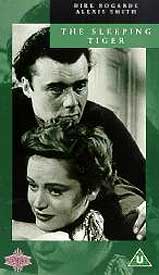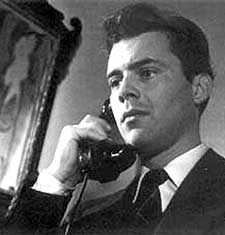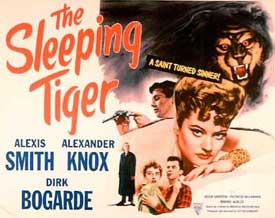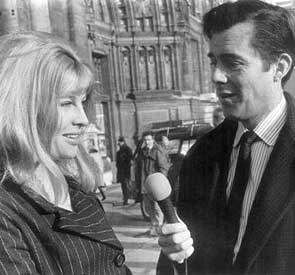 The story of Darling (1965), if there is one, amounts to a query: What if someone like Princess Grace were nothing but a dimwitted social climber reliant on beauty to not be chucked out the door by her betters, incapable of knowing love when she sees it, & ultimately has to make do with all the money & success the world can offer, all the while lacking the imagination to figure out what to do with all that money that would be fulfilling. The story of Darling (1965), if there is one, amounts to a query: What if someone like Princess Grace were nothing but a dimwitted social climber reliant on beauty to not be chucked out the door by her betters, incapable of knowing love when she sees it, & ultimately has to make do with all the money & success the world can offer, all the while lacking the imagination to figure out what to do with all that money that would be fulfilling.
Julie Christie plays that sort of dim bulb who scores everything she wants then feels lonely & empty. The role won her an Academy Award, but playing a stupid selfish bimbo well doesn't make the character any more appealing. I didn't mind her amorality so much as her lack of imagination.
In 1965, cussing in a film, or dealing with issues like homosexuality or abortion, were daring ingredients. But all these years later it seems to be mostly about someone too spoiled & too foolish to even be interesting.
Even the sophistications of the piece ring false & the film seems merely commercial for its time, unlike certain works by Cassavetes or Antonioni that cover the same ground with genuine artfulness.
There are moments midway in the film when it almost shines as an imitation of something by Truffaut, but it invariably shoots itself down. In the end it's only an anti-fairy-tale no more credible than an actual fairy tale. But Dirk Bogarde at least keeps things interesting so that it wasn't too difficult to stick it out to the bitter end of the show.
 Exiled to England by McCarthyism, Joseph Losey directed The Sleeping Tiger (1954) under the pseudonym Victor Hanbury for fear his blacklisted name might sabotage the film's distribution. Exiled to England by McCarthyism, Joseph Losey directed The Sleeping Tiger (1954) under the pseudonym Victor Hanbury for fear his blacklisted name might sabotage the film's distribution.
Loud crime noir with an eerie jazz score & appealing cinematography, based on a novel by Maurice Moisiewitsch, Sleeping Tiger opens on a dark cobbled street. A mugger with a gun discovers his intended victim gets the drop on him. But rather than call the police, Dr Clive Esmond (Alexander Knox) invites the criminal to his home as a guest.
The doctor offers to share his home with Frank Clemmons (Dirk Bogarde) in exchange for submitting to experimental psychotherapy designed with the hope of curing criminal tendencies.
 Bogarde's performance as Frank makes this a wonderful film, despite that the other two key performances pale by comparison. That is not to say Alexander Knox & especially Alexis Smith aren't splendid, it's just that Dirk commands the screen with his unusual combination of menace, beauty, & unexpected vulnerability. Bogarde's performance as Frank makes this a wonderful film, despite that the other two key performances pale by comparison. That is not to say Alexander Knox & especially Alexis Smith aren't splendid, it's just that Dirk commands the screen with his unusual combination of menace, beauty, & unexpected vulnerability.
The doctor's deceptively detached interest in his "subject" is contrasted to his wife's sensual fascination which at first she poorly disguises as dislike. Unbeknownst to the doctor, Frank continues to commit robberies & carouse with shady characters.
Frank introduces Clive's wife Glenda to the Soho club scene. Her aloof coldness warms when she sees such daring free spirits so unlike herself.
Alexis Smith has a fairly interesting role in that there's something more than temptation to commit adultery in Glenda's emotional make-up, some deeper sadder seeking need. And there's more than a mild irony that while Clive is striving to change the nature & behavior of Frank, Frank is inspiring new behaviors in Glenda. Oddly, though, the character of Glenda becomes much less complex as soon as the budding relationship with Frank becomes torrid.
 The psychoanalysis angle, though overly simplistic, does add a layer of intrigue. Who manipulates whom is never completely certain. Frank makes the doctor into a father figure, & he hated his father. Glenda he makes his lover, which may well reflect an unwholesome relationship once experienced with a step-mother. The psychoanalysis angle, though overly simplistic, does add a layer of intrigue. Who manipulates whom is never completely certain. Frank makes the doctor into a father figure, & he hated his father. Glenda he makes his lover, which may well reflect an unwholesome relationship once experienced with a step-mother.
The doctor begins protecting Frank (from the police) with a fatherly compassion, even when his surrogate son pulls a bold daytime robbery. This undeniable act of caring sets the groundwork for an emotional & psychological breakthrough.
Frank becomes so devoted to the doctor that he wants to be with him at all times. Glenda becomes increasingly jealous of this transfer of affection. The psychology of the situation really does become twisted, but is only at a couple critical points a little too pat.
Frank & Glenda had made plans to run away together. But Frank's heightening fondness for Clive, if not his new morality, will not permit him to see the plan through.
The film begins with the insinuation that inviting a criminal into one's house is like living with a sleeping tiger. But the "sleeping tiger" of the title is actually Glenda, not Frank. "You've never seen me really angry," she warns with a foreshadowing menace.
She fakes having been assaulted by Frank. Her husband's own long suppressed emotions erupt, as though both husband & wife had been sleeping tigers. The climax that unravels from this situation is sick, sick, sick -- against a stark, dark landscape of ruin. An amazing though widely under-appreciated film.
copyright © by Paghat the Ratgirl
|

